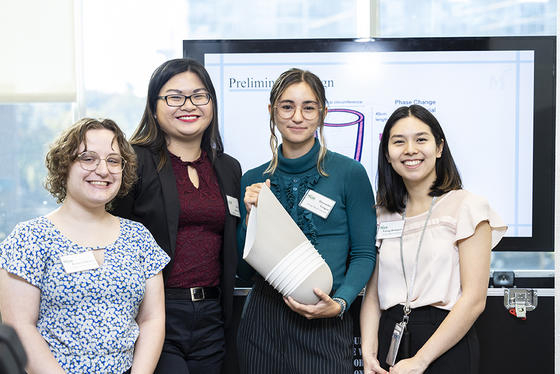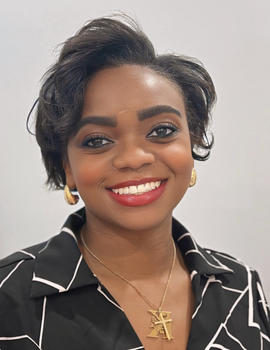As a capstone to the bioengineering program at George Mason University, senior students complete a team-based, two-semester design project developing solutions to real-world biomedical and/or clinical problems.
At the topping off ceremony for Fuse at Mason Square, Mason bioengineering majors Alessandra B Coogan, Katie A Harrison, Karmel Webster, Rachel A Ometz, and Sujung Rodriguez presented their group’s project on a novel prosthetic sleeve.
Tell us about your project.
Prosthetic liners are integral in ensuring a socket fits properly and comfortably. But due to the nature of their design, prosthetic users face the challenge of heat and moisture accumulation around the residual limb. On a hot August day, a simple walk to the mailbox can generate such a significant amount of sweat that bacterial infections, blisters, and swelling can develop. Despite the plethora of solutions saturating the market, the problem endures, propelling our team to confront this issue with a user-centered perspective.
What inspired you to select this topic?
Our motivation to take on this challenge springs from a profound belief that prosthetics should transcend mere functionality; they should empower, not limit. Furthermore, this undertaking allows for the blend of diverse disciplines, ranging from material science to computational modeling. Moreover, dedicating our senior year to this cause provides us with the unique opportunity to give back to the communities around us and raise awareness about the challenges faced by individuals with amputations.
What has been your greatest success thus far?
Our greatest success is the number of people we've met who are willing and eager to help us with our project. We think that speaks to the greater collaborative nature of science and innovation, embodying Mason's mission: innovation is our tradition.
What is one thing you’ve learned while working on this project that will be useful to you in the field?
How iterative the design process is. Each iteration of brainstorming, prototyping, and refinement may seem like setbacks at first, but in reality are new avenues we can approach from a different, more educated perspective. On top of this, feedback is critical. The relationship between iteration and feedback has been instrumental in propelling our project forward. It underscores the importance of adaptability and the continuous quest for improvement.
How would dedicated research space, such as the plans for Fuse at Mason Square, help sustain your project?
Fuse would offer us the opportunity to connect with individuals from myriad backgrounds and experiences. In such a richly diverse environment, the ability to garner insights from individuals beyond the confines of our field or even engineering becomes a potent catalyst for innovation. Fuse becomes not just a physical space but an incubator for cross-disciplinary dialogue and ideation for anyone.


Related News
- January 15, 2026
- November 4, 2025
- October 14, 2025
- September 19, 2025
- August 6, 2025
